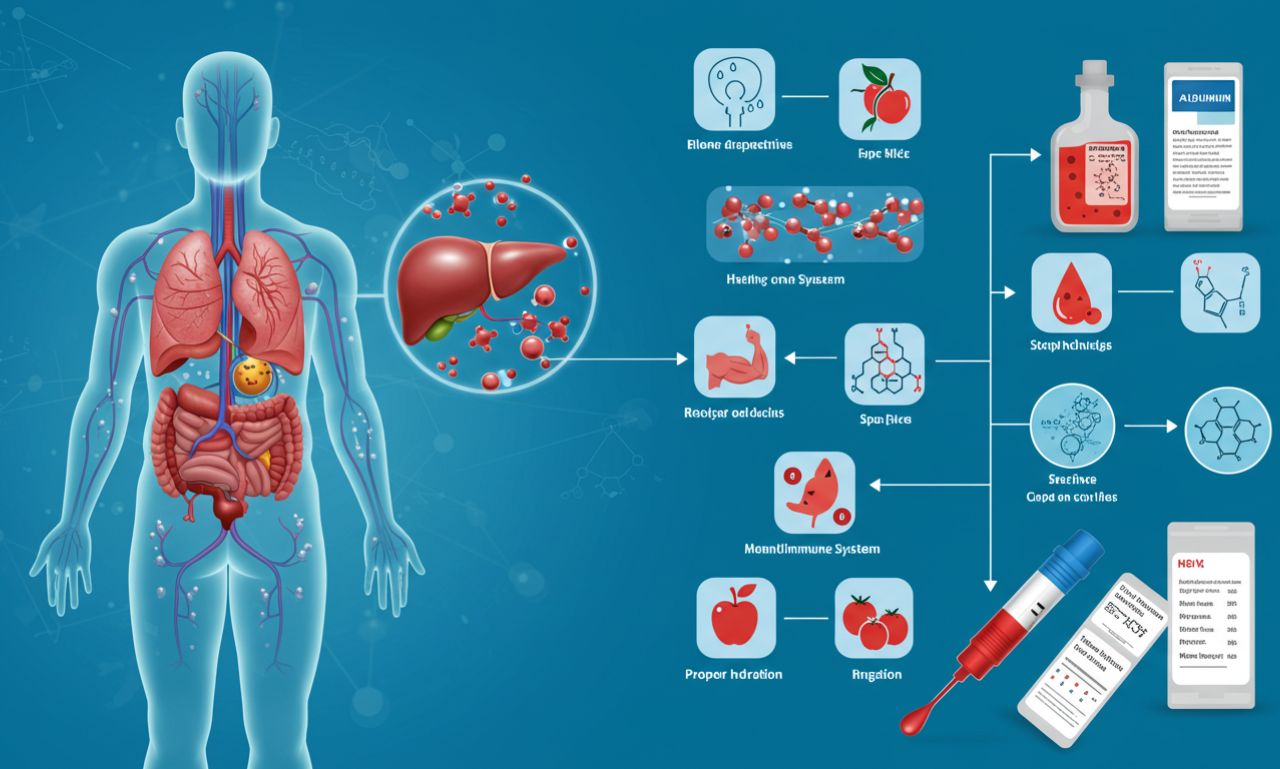albumīns is a vital protein found in the blood plasma, playing a crucial role in maintaining fluid balance, transporting substances, and supporting overall health. It is produced mainly by the liver and has diverse functions, making it one of the most important proteins in human physiology.
Whether you’re learning about albumīns for medical reasons, nutritional awareness, or academic research, understanding its role in the body can offer valuable insights into maintaining health and diagnosing certain conditions.
What is albumīns?
albumīns is a water-soluble protein that makes up about 50–60% of total plasma protein in humans. It’s responsible for maintaining oncotic pressure (the pressure that keeps fluid from leaking out of blood vessels) and acts as a carrier for hormones, vitamins, drugs, and other vital compounds.
Key facts about albumīns include:
-
Produced primarily by the liver
-
Has a half-life of about 20 days
-
Vital for transporting nutrients and hormones
-
Helps maintain blood volume and pressure
Functions of albumīns in the Body
albumīns has multiple roles that affect almost every organ system. These include:
-
Maintaining Oncotic Pressure – Prevents excessive fluid from leaking into tissues.
-
Transporting Molecules – Binds to and carries substances like bilirubin, fatty acids, and hormones.
-
Buffering Blood pH – Helps stabilize blood pH levels.
-
Drug Binding – Many medications rely on albumīn for transport in the bloodstream.
This versatility makes it a cornerstone of healthy blood function.
Medical Importance of albumīns
Low or high levels of albumīns can indicate various health conditions:
-
Hypoalbuminemia – Low albumīn levels, often caused by liver disease, malnutrition, inflammation, or kidney problems.
-
Hyperalbuminemia – High levels, often linked to dehydration or high protein intake.
Doctors often order an albumīn test as part of a liver function panel or metabolic profile to evaluate health conditions.
Causes of Low albumīn Levels
Hypoalbuminemia can result from:
-
Liver Disorders – Hepatitis, cirrhosis, or liver failure reduces production.
-
Kidney Disease – Loss of albumīn in urine due to nephrotic syndrome.
-
Malnutrition – Inadequate protein intake.
-
Inflammatory Conditions – Chronic illnesses that affect protein metabolism.
Symptoms of Low albumīns Levels
When albumīns levels drop, symptoms may include:
-
Swelling (edema) in legs, ankles, or abdomen
-
Muscle weakness
-
Fatigue
-
Difficulty healing wounds
-
Increased susceptibility to infections
Early detection through blood tests can prevent complications.
Causes of High albumīn Levels
High albumīn levels are less common but can occur due to:
-
Dehydration – Reduced water volume in the blood increases protein concentration.
-
High Protein Diets – Excess dietary protein intake.
-
Certain Medications – Drugs like corticosteroids.
Testing albumīns Levels
A serum albumīns test is performed to measure the protein’s concentration in the blood. This test helps:
-
Monitor liver and kidney health
-
Assess nutritional status
-
Guide treatment decisions for chronic diseases
Normal range: Approximately 3.4 to 5.4 g/dL (grams per deciliter) for adults, though ranges can vary by lab.
albumīn in Nutrition
Since albumīn is a protein, dietary protein plays a role in maintaining its levels. Good dietary sources include:
-
Eggs
-
Lean meats
-
Fish
-
Dairy products
-
Legumes and beans
-
Nuts and seeds
Ensuring adequate protein intake supports the body’s ability to produce albumīns.
albumīn and Medical Treatments
In hospitals, albumīn is sometimes given intravenously as part of treatment for:
-
Shock due to blood loss
-
Severe burns
-
Liver failure
-
Certain kidney conditions
These albumīn infusions help restore fluid balance and increase plasma protein levels quickly.
albumīns in Research and Biotechnology
albumīns is also used in laboratory research, particularly in:
-
Cell Culture – Providing nutrients to cells in vitro.
-
Drug Development – Testing drug-binding properties.
-
Biochemical Studies – Serving as a model protein due to its stability.
Maintaining Healthy albumīns Levels
To keep albumīns levels within a healthy range:
-
Eat a Balanced Diet – Include enough protein from varied sources.
-
Stay Hydrated – Prevent dehydration-related fluctuations.
-
Manage Chronic Conditions – Treat liver, kidney, and digestive issues promptly.
-
Avoid Excess Alcohol – Protects liver function.
Global Health Perspective on albumīns
In many developing countries, low albumīns levels are a marker of malnutrition and chronic illness. Public health strategies often focus on improving dietary protein intake and access to healthcare to prevent deficiencies.
Future Research on albumīn
Emerging research is exploring:
-
Albumīns as a Drug Delivery Agent – Binding drugs for targeted therapy.
-
Synthetic Albumīn – For use in blood substitutes.
-
Albumīn Biomarkers – Predicting disease progression in chronic illnesses.
Conclusion
albumīns is more than just a blood protein—it’s a critical component of health, influencing hydration, nutrient transport, and overall body stability. Understanding its functions, causes of imbalance, and ways to maintain optimal levels can help improve health outcomes and prevent disease.
By staying informed and prioritizing balanced nutrition, regular health checkups, and hydration, you can ensure that your albumin levels remain within the healthy range, supporting overall well-being.

